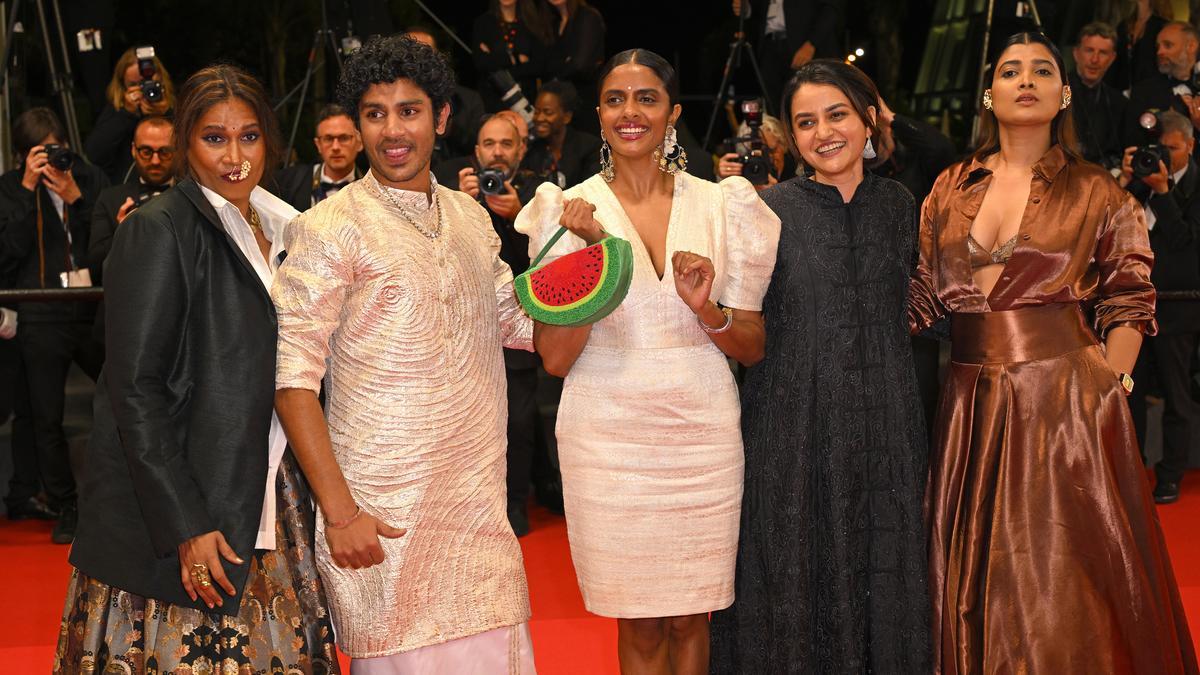
Indian actor Kani Kusruti made a powerful statement at the Cannes Film Festival by showing her solidarity with the victims of the ongoing conflict in Gaza. Walking the red carpet for her film “All We Imagine As Light,” Kani was more than just a mere participant; she carried a symbolic message with her accessories that took the internet by storm.
Kani, one of the two leading actors in Payal Kapadia’s film, which is competing for the prestigious Palme d’Or, accentuated her outfit with a unique handbag. This was no ordinary fashion statement; the handbag was shaped like a watermelon slice—a symbol representing Palestinian resistance against Israeli occupation. The colours of the watermelon—red, green, white, and black—correspond to those of the Palestinian flag. This symbolism has deep roots, as, following the six-day war in 1967, Israel banned displays of the Palestinian flag, and the watermelon emerged as an alternative political symbol.
Kani’s courageous act did not go unnoticed; social media platforms were abuzz, praising her bravery during a time when many actors, both in India and Hollywood, have evaded taking a stance on the escalating conflicts in the region. The image of Kani with her watermelon pouch quickly went viral, marking an iconic moment at the festival.
Joining her on the red carpet were other notable figures involved in the film “All We Imagine As Light”—Chhaya Kadam, Hridhu Haroon, director Payal Kapadia, and co-star Divya Prabha. They too were captured in memorable photographs, making a collective statement of focus and passion for their project.
The unique watermelon bag was designed by Diya John, a designer based in Kochi, who also crafted Kani’s entire ensemble for the event. Kani wore a stunning white bodycon silk dress, seamlessly paired with the watermelon clutch that added a layer of profound meaning to her appearance. Salt Studio, Diya John’s boutique, shared an insightful video showcasing the creation process of this symbolic clutch, further deepening the appreciation for this artisanal piece.
Later, Kani spoke about her choice of accessory at the press conference for the film. “I wanted something like that,” she explained.
. “So I asked my friend [John], who crafted it by hand.” Her simple yet poignant explanation added another layer of authenticity to her bold statement.
The gesture by Kani Kusruti was reminiscent of a similar act by Australian star Cate Blanchett, who had previously arranged her Cannes red carpet outfit to honour the Palestinian flag. Blanchett, attending the premiere of “The Apprentice,” wore a black gown adorned with a white back and green hemwork. The red carpet itself completed the colours of the Palestinian flag, symbolizing silent yet powerful solidarity.
“All We Imagine As Light” tells the compelling story of two Malayali nurses living in Mumbai. The film had a remarkable reception, receiving an eight-minute standing ovation and winning rave reviews upon its premiere in the main competition at Cannes. It stands out as the first Indian film in three decades to be in contention for the Palme d’Or, the festival’s highest accolade.
This year’s Cannes Film Festival has seen Indian cinema taking center stage once again, not just through impressive storytelling but also through significant cultural and political statements. Kani Kusruti’s watermelon clutch has become an emblematic image, representing the intersection of art, fashion, and activism. Her move has inspired many and reignited conversations about the power of symbolic gestures in international forums like Cannes.
Through her daring choice, Kani has spotlighted an important humanitarian issue while at the same time elevating Indian cinema to new heights on a global platform. The actor’s stance serves as a reminder of the influential role that public figures can play in advocating for justice and peace. Whether it’s through the films they make, the roles they choose, or the statements they make on global stages, artists like Kani Kusruti prove that cinema is not just about entertainment—it is about making a difference.












